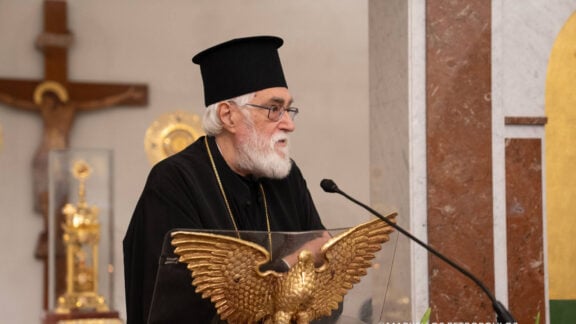In view of the public consultation, which ends on Monday July 17th, about the bill to lift voting restrictions for Greek citizens living abroad, who are already enrolled on the electoral role of Greece, a bill that the recently re-elected Mitsotakis government intends to bring to Parliament by the end of July, most probably, allow me to briefly refer to some key aspects of this issue.
I am writing as a politically and socially active Greek citizen living in Australia, as a long-time supporter of the right to vote if you are a Greek citizen living abroad, but also as a former Special Adviser to General Secretaries for Greeks Abroad (1999-2004). I have followed this issue over many decades and I do have a point of view, stated publicly, via the pages of Neos Kosmos as well, about the nature and the relationship that is required to be cultivated between Greece and its many diasporas around the globe, if both parties are to benefit.
The public debate that needs to take place, heading towards the tabling of the bill, and any decisions taken, should not be opportunistic or arrogant, as a result of the recent triumphant re-election of the current government.
Neither should be affected by fears and preconceptions that have nothing to do with the current characteristics of the existing polymorphic Greek diasporas.
If there is to be a strategic upgrading and a strategic depth and duration, between the Greek state and Greek citizens living abroad, that would advance the interests of both, then the soon to become law bill, must be significantly more liberal than the current law.
At the same time though, it must also retain a few prerequisites, as to who can vote in Greece, now that this global nation is defined not only as a linguistic, or as a cultural community, but also as a political community as well.
The proposed disentanglement of the right to vote for Greeks abroad, from the submission of a tax return, is a positive development. It is not right, it is not democratic, that the supreme political and civic right of citizens, the right to vote, should be defined in relation to the submission or not, of a tax return!
However, the idea of granting the right to vote to all expatriate Greeks, who are registered on the electoral rolls of Greece which include 9.8 million registered voters, when the entire country has a total population of 10.5 million, needs to be reconsidered.
When the Greek state sets time limits, certified by a consular authority abroad, for the recognition of the status of a male Greek citizen as permanently residing abroad, so that males can do reduced military service in Greece, then, for the supreme political and civic right, that of voting, similar conditions must apply. Why, for instance, should a male Greek citizen residing abroad, who has not fulfilled his mandatory military service, have the right to vote? When this opportunity is not extended to a Greek male citizen and voter who resides in Greece?
Yes, we have to make it easier for Greek citizens living abroad to vote at Greek elections. We should be facilitating this process, by adopting for example the postal vote. However, we need to ensure that time limitations are also in place, in order to ensure that the voters still retain a close political, civic and societal connection with Greece. Australia does not allow you to vote, if you continue to live overseas for more than six years.
Facilitating the voting for Greeks living abroad, must go hand in hand with the facilitation of the voting process within the boundaries of Greece as well.
By adopting for example, Australia’s early polling stations practice. It is worth remembering that almost half of the electorate that took part in the May 2022 federal election in Australia, voted at 500+ early polling stations that opened about two weeks before the actual election date. Easier electoral processes that increase the the participation rates of citizens, ensure the legitimisation of politics and the protection of the democratic state.
Furthermore, the facilitation of the voting for expatriate Greek citizens, needs to be accompanied by the granting of substantial political rights, including the right of vote and to stand as candidates, to all legal immigrants permanently living in Greece, for many years.
The interests of the foreign immigrants permanently and legally living in Greece, where they work and where they raise their families, their relationship with Greece and Greek society for example, are much closer, are more in line with the interests, the issues faced, and the expectations held by the wider society of Greece, than those of Australian, American, or Canadian citizens and residents, who might be able to trace their Greek origin sometime in the past.
Another important issue worth of our attention in the proposed bill now, is the following. When before a parliamentary election in Greece, we have the appointment of care taker ministers in the various departments that run the elections… When during the last month before the June 2023 election Greece was ran by a care taker government and a caretaker PM…. When the weak Greek state and its bureaucracy are used and abused by respective government, then, the power to accept or to reject who can and who cannot enrol on the electoral roll, is better to rest with an independent authority, like the Australian Election Committee for example, or to a bipartisan parliamentary committee, and not to the Department of Home Affairs.
Progressive political parties that intend to respond positively to the Mitsotakis government’s call to vote in parliament in favour of the proposed bill, need to rise to the occasion and to set “conditions” related to all of the issues raised in this opinion article, I think. It is not enough for the former socialist governing party of Greece PASOK, to just say yes to the initiative of the current government, because this is what PASOK has advocated ever since it was founded in 1974. It is not enough for the small left-wing party Plefsi Eleftherias lead by former Syriza speaker of Parliament Zoi Konstantopoulou, to just say yes to the government.
As for the parties of the Greek left, that might have misgivings, because they fear the electorate will change massively once the restrictions are lifted, or because they perceive the Greek diasporic communities as being conservative and politically closer to New Democracy…
More than once in the past few years, two left wing daily newspapers in Athens, AVGI and Efymerida ton Syntakton, have published articles claiming that, potentially as many as 3 million new expatriate voters, with conservative orientation can be added to the current electoral roll of Greece. They are afraid that Greece might be “invaded” by Diaspora Greeks, who cannot even find on the map the hometown of their forefathers and foremothers! They keep propagating this myth without considering the following…
During the recent May-June 2023 parliamentary elections, out of the almost 500,000 Greek citizens who migrated and live abroad, as the result of the decade long financial crisis in the 2010s, only 25,000 bothered to enrol to vote. Roughly 500,000 recent Greek migrants and citizens had the right to vote and only 25,000 decided to do so!
According to the official censuses of the countries of permanent residency of Greek origin citizens living abroad, the Greek diaspora does not even reach 3 million… As an example, I mention that in the large diasporic centres around the globe you have: in the USA approximately 1 million people declaring themselves to be of Greek origin, in Australia 425,000, in Germany about 435,000, in Canada 262,000, etc…
The vast majority of Greek citizens living abroad, as well as of Greek origin citizens, do not show an interest to join even their own local community organisations, perhaps because politically, culturally, socially, or in terms of values held, they find the mainstream to be much friendlier and accommodating to their own needs and sensitivities, or possibly because they address issues of ethnic identity and culture in the private sphere, or in a celebratory public arena once or twice a year… When the diasporic Greeks do not join their own community institutions, why should they rush to join the electoral roles of Greece?
When, for example in Melbourne, with a population of 180,000 residents of Greek origin, the largest organization, the Greek Orthodox Community of Melbourne and Victoria has only 1,000 financial members in an election year, then, why should, or how many members of the second or third generation of Greek-Australians should rush to enrol to the electoral rolls of a fa away to their daily lives and experiences country, like Greece?
If the parties of the Greek centre-left and left hope to become again, one day, influential and agents of progressive governance in Greece, then they need not have any phobias about the voting influence of Greek citizens living abroad, or of the Greek diasporic communities.







